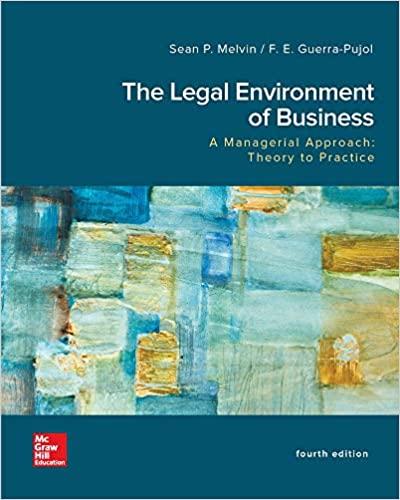Question
Title: Analysis of Case Law: Standards of Review of Administrative Law: Canada v. Vavilov 2019 Introduction: The case of Canada v. Vavilov in 2019 is
Title: Analysis of Case Law: Standards of Review of Administrative Law: Canada v. Vavilov 2019
Introduction:
The case of Canada v. Vavilov in 2019 is a significant milestone in Canadian administrative law. This landmark decision by the Supreme Court of Canada has had far-reaching implications, particularly in the field of immigration. This discussion post aims to delve into the importance of the case, highlight the changes it brought to Canadian immigration, and shed light on how it will impact future applicants.
Why is this case important?
Canada v. Vavilov is important because it clarified and rewrote the framework for judicial review of administrative decisions, which had been inconsistently applied across Canadian courts. Prior to this case, the courts employed a two-pronged framework consisting of the reasonableness and correctness standards. However, this led to confusion and inconsistency in the review process. The Supreme Court's decision in Vavilov sought to bring stability, predictability, and uniformity to the administrative law jurisprudence.
What changed in Canadian immigration because of this decision?
The Vavilov case significantly changed the standard of review in Canadian immigration law. It established that the general rule for reviewing administrative decisions is reasonableness, rather than correctness. Under the previous framework, courts often intervened and substituted their own judgment, leading to a less deferential approach towards administrative decision-makers. However, in Vavilov, the Supreme Court emphasized that courts should generally respect the expertise and authority of administrative tribunals and defer to their decisions.
Moreover, the case introduced a revised framework for determining the applicable standard of review. It outlined a two-step analysis that includes examining the purpose and nature of the decision being reviewed, as well as a list of exceptions to the general reasonableness standard. This new framework provides a clear and structured approach for reviewing administrative decisions and ensures that greater deference is given to the decision-makers.
How will it impact future applicants?
The impact of the Vavilov decision on future immigration applicants is twofold. Firstly, it enhances the level of fairness and predictability in the immigration decision-making process. By emphasizing the importance of providing reasons that are transparent, justified, and intelligible, the Vavilov framework promotes more informed and reasonable decision-making by administrative tribunals. This is particularly beneficial to applicants, as it reduces the risk of arbitrary or irrational decisions.
Secondly, the Vavilov decision emphasizes the importance of expertise and specialized knowledge in immigration-related matters. This means that future applicants can have more confidence in the expertise of the decision-makers, such as the Immigration and Refugee Board of Canada. The greater deference given to administrative tribunals signifies that their decisions will generally be upheld as long as they fall within a range of reasonable outcomes.
It is important to note that the Vavilov decision does not eliminate the possibility of judicial review or the right to challenge administrative decisions. However, it establishes a more structured and predictable approach that sets a higher threshold for overturning decisions.
Conclusion:
In conclusion, the Canada v. Vavilov case has significantly impacted Canadian administrative law, particularly in the field of immigration. By establishing a new, structured framework for reviewing administrative decisions, the case has brought much-needed clarity and predictability to the process. It promotes greater deference to administrative tribunals, enhances transparency, and reduces the risk of arbitrary decision-making. Future immigration applicants will benefit from an improved decision-making process, providing them with fairer and more reasonable outcomes.
Administrative Law.
Write discussion of this post. Should be well structured, properly written, critical analysis of one peers' Primary Posts. Students should develop peers' ideas, add constructive comments on peers' Primary Posts, and write between300 and 500 words. Secondary Posts should includeat least one reference. Please do not write "I agree" or "I disagree" or "The post is well written, I will just add". Explain your critical point of view. When writing posts, should not simply copy and paste content from the peer's posts or from other sources without a proper acknowledgment of the authorship whileadding personal, critical contributions or developments to the topic.
Step by Step Solution
There are 3 Steps involved in it
Step: 1

Get Instant Access to Expert-Tailored Solutions
See step-by-step solutions with expert insights and AI powered tools for academic success
Step: 2

Step: 3

Ace Your Homework with AI
Get the answers you need in no time with our AI-driven, step-by-step assistance
Get Started


